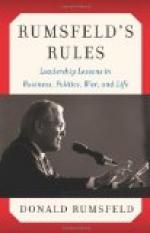If the cardinal principle is to put all your strength into the decisive blow, its corollary is that you should deliver the blow as soon as you can, for in war time is as precious as lives. Here again it is not easy to judge whether the Boer Commander-in-Chief is fulfilling his mission. When the ultimatum expired his forces were spread along the border line of the Free State and the Transvaal, so that a forward movement would concentrate them in the northern triangle of Natal. The advance has not been resisted, and at the end of a week the Transvaal wing of the combined army has reached a point a few miles north of Glencoe, while the bulk of the Free State wing is still behind the passes. The movement has not been rapid, but as the ground is difficult—marches through a mountainous country and in bad weather always take incomparably longer than is expected—the delay may be due not to lack of energy but to the inevitable friction of movement. The mere lapse of time throws no light on the Boer plan, for though sound strategy counsels rapidity in the decisive blow, rapidity is a relative term, the pace varying with the Army, the country, and the weather.
Sir George White’s object is not merely to make the time pass until Sir Redvers Buller’s forces come upon the scene. He has also to prevent the Boers from gaining any great advantage, moral or material. Time could be gained by a gradual retreat, but that would raise the courage of the Boer party, and depress the spirits of the British. Accordingly Sir George White may be expected to take the first opportunity of showing the Boers that his men are fighters, but he will avoid an engagement such as might commit a fraction of his force against the Boer main body. The detachment which was a few days ago near Glencoe may be expected, as the Boer advance continues, to act as a rear guard, of which the business is to delay the enemy without running too great a risk of being itself cut off, or as an advance guard, which is to be reinforced so soon as the general drift of the Boer movements has been made out. The next few days can hardly pass without an engagement in this quarter of Natal, and the first serious engagement will throw a flood of light upon the aims of both generals and upon the quality of the troops of both sides. Meantime the incidents of last week, the wreck of the armoured train, and the attacks which have probably been made upon Mafeking and Kimberley, are of minor importance.
A very serious piece of news, if it should be confirmed, is that the Basutos have begun to attack the Free State. The British authorities have exerted themselves to the utmost to prevent this and to keep the Kaffir population quiet. The mere fact of the existence all over South Africa of a Kaffir population outnumbering Boers and British together made it an imperative duty of both white races to come to a peaceful settlement. This was as well known to the Boers as to the British, and forms an essential factor in any judgment on the action which has caused and precipitated the conflict.




